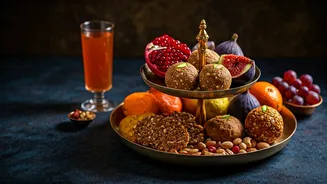Diwali's Dietary Dilemma
Diwali, a festival characterized by vibrant celebrations, often involves a wide variety of sweets and fried foods. These traditional treats, while delicious,
can sometimes lead to excessive calorie consumption and a potential imbalance in one's diet. The abundance of ghee, sugar, and refined carbohydrates in these sweets can present challenges for individuals aiming to maintain their health. Moreover, the lack of fiber and essential nutrients in many Diwali snacks can contribute to digestive issues and affect overall well-being. It is important to be aware of these potential pitfalls and to approach the festival with mindful eating habits. Diwali is a time for joy and togetherness, and it is entirely possible to enjoy the festive spirit without compromising on health goals. This calls for making informed decisions regarding food choices and balancing indulgence with healthier options to celebrate with a clear conscience.
Smart Sweet Swaps
One of the key aspects of a healthier Diwali involves making smart choices when it comes to sweets. Traditional sweets often contain a high amount of refined sugar and unhealthy fats. However, it's possible to substitute these ingredients with healthier alternatives to create equally delicious treats. For example, replacing refined sugar with jaggery or dates can add sweetness while also providing some added nutrients. Opting for homemade sweets over store-bought versions allows for better control over ingredients and portion sizes. Consider using whole wheat flour or oats in place of refined flour in your recipes. Instead of frying sweets, explore baking or grilling as alternative cooking methods. Also, experiment with incorporating nuts and seeds into your sweets, which not only add texture and flavor but also provide healthy fats and essential minerals. This strategy promotes a balanced approach to the festive season's sweet indulgences, reducing health risks and promoting overall well-being.
Portion Control Matters
Even with healthier sweet options, portion control plays a crucial role in maintaining a balanced diet during Diwali. It's easy to overindulge during festive times, but mindful eating habits can make a significant difference. Start by planning your meals and snacks in advance to avoid impulsive decisions. This way, you can have a general idea of the quantities you’re aiming to consume. Use smaller plates and bowls to control portion sizes and be conscious of how much you are eating. Try to savor each bite and pay attention to your body's hunger and fullness cues. Avoid eating directly from large containers of sweets or snacks, as this often leads to overconsumption. Instead, portion out individual servings and enjoy them at a leisurely pace. By adopting these strategies, you can indulge in festive treats without compromising your health goals. This conscious approach allows you to appreciate the flavors and celebrations of Diwali while staying mindful of your overall dietary intake.
Savory Sensations
While sweets are a major part of Diwali, a balanced diet includes a variety of savory options. Consider incorporating healthier savory snacks to balance the sweetness and provide essential nutrients. Prepare snacks like roasted nuts and seeds, which are packed with healthy fats and protein. Choose baked or air-fried snacks over deep-fried ones to reduce the intake of unhealthy fats. Include vegetable-based snacks, such as vegetable skewers or chaats with a low-fat dressing, to increase your fiber and vitamin intake. Opt for homemade versions of snacks, giving you greater control over ingredients and preparation methods. These options offer a delightful way to balance your festive meals and support a healthier diet during the Diwali celebrations. This strategic approach ensures a harmonious blend of flavors and textures, making it easy to enjoy the festival's culinary offerings without compromising on nutritional value.
Mindful Hydration Habits
Staying hydrated is extremely important during Diwali, as it can help you maintain overall well-being. Dehydration can worsen the effects of rich foods and sweets, leading to discomfort and potentially affecting energy levels. Make sure you drink plenty of water throughout the day. Consider adding fresh fruits like lemon or cucumber to your water to enhance flavor and hydration. Avoid sugary drinks like sodas and packaged juices. Instead, choose herbal teas or unsweetened beverages. Keep a water bottle with you and refill it regularly to ensure adequate fluid intake. Being adequately hydrated can aid digestion and facilitate the elimination of toxins, thereby helping you to maintain your energy levels and enjoy the festive season. Prioritizing hydration along with mindful eating habits can create a balanced and pleasurable Diwali experience, promoting both physical well-being and a sense of joy.
Embrace Active Celebrations
Alongside mindful eating habits, staying active is crucial during the Diwali festival. Physical activity helps in burning excess calories and keeps your metabolism active. Plan activities that incorporate movement into your celebrations. This can include anything from taking walks to visiting family and friends. Organize games or dance sessions at home to have fun and stay active. If possible, make time for your regular workouts or exercise routines. Even simple activities like climbing stairs instead of using elevators or taking short walks during breaks can contribute to increased physical activity. Embracing an active lifestyle during Diwali not only helps in managing weight but also improves your mood and overall well-being. Combining exercise with healthy eating habits can offer a holistic approach to enjoy the festive season with energy, vitality, and balance.














